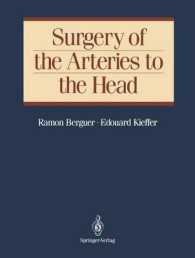- ホーム
- > 洋書
- > 英文書
- > Literary Criticism
Full Description
Examines the connection between historical and speculative fiction to offer a new form of literary-genre fiction that registers the upheavals of the early twenty-first century
Provides detailed critical readings of key writers of the early 21st century
Theorizes a reading practice and its relation to the question of literature's political role in the 21st century
Establishes a new form of literary-genre fiction that registers the upheavals of the early 21st century and potential literary answers to them
Utopian Pasts and Futures in the Contemporary American Novel highlights the emergence of a literary mode, speculative historism, over the past two decades in U.S. literature. Discussing in depth novels by writers such as Ken Kalfus, Joyce Carol Oates, and Colson Whitehead, among others, it integrates questions of critical method, genre, form, and literary theory, all of which have some urgency today. Addressing itself to the question of how to read this mode through a form of utopian hermeneutics, this study explores the formal constitution, narrative choices, and place in the wider literary market of a mode that it believes to be constitutively important for understanding American literature's struggle with the possibility of imagining hopeful futures.
Contents
Acknowledgements
Introduction: Speculative Historism, Visible Historical Futures
At the Edges of Realism: Ken Kalfus's Equilateral
The Prismatic Lens of Genre: Joyce Carol Oates's The Accursed
A Less Oblique Mode of Political Art: Chris Bachelder's U.S.! and Jason Heller's Taft 2012
Escapism, Nostalgia, and Hope: Ernest Cline's Ready Player One
Marvellous Histories, Possible Futures: Junot Díaz's The Brief Wondrous Life of Oscar Wao
Slavery and Speculation: Colson Whitehead's The Underground Railroad and Ben Winter's Underground Airlines
Conclusion: Speculative Historism and Contemporary Hope
Bibliography
Index






